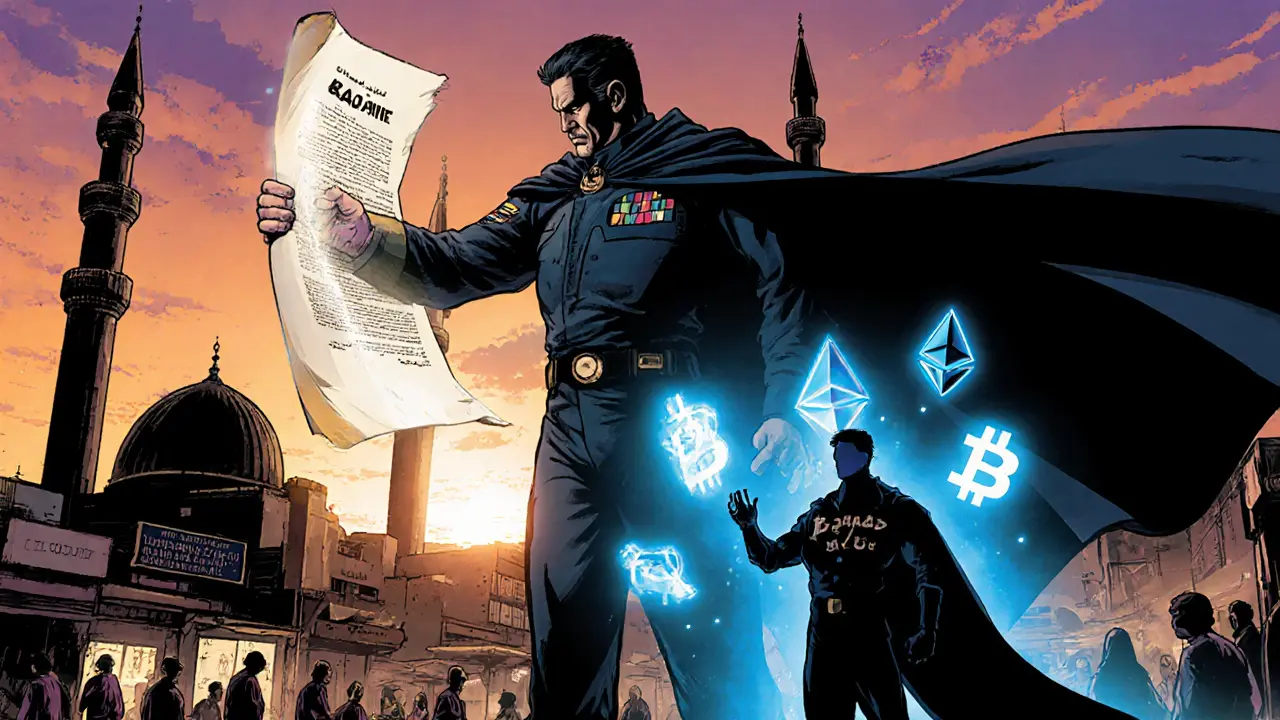Iraq Crypto Ban Comparison Tool
Iraq's 2017 Crypto Ban Overview
Iraq banned cryptocurrency trading and mining in 2017 citing financial crime risks, market volatility, tax evasion, and consumer protection concerns. This tool compares Iraq's ban with similar policies globally.
Select a country and click 'Compare with Iraq' to see the analysis.
| Country | Year of Ban | Main Reason(s) |
|---|---|---|
| China | 2021 | Financial stability, energy consumption |
| Bangladesh | 2017 | Money-laundering, fraud |
| Egypt | 2020 | Economic & religious concerns |
| Algeria | 2018 | Regulatory vacuum |
| Afghanistan | 2022 | Security & illicit financing |
| Morocco | 2023 | Consumer protection |
| Bolivia | 2024 | Market volatility |
| Russia | 2023 | Sanctions & AML |
| Nepal | 2021 | Financial crime risk |
| Iraq | 2017 | AML, consumer protection, energy concerns |
When the Iraq crypto mining ban was introduced in 2017, it placed a blanket prohibition on all cryptocurrency trading and mining within the country, the digital‑asset scene went underground. Iraq crypto mining ban still dictates what locals can (or cannot) do with Bitcoin, Ethereum, and other tokens, and it influences how international businesses approach payments in the region.
- Understand why the Central Bank of Iraq outlawed crypto in 2017.
- Learn how enforcement has unfolded and what legal risks remain.
- See how Iraq’s underground community keeps trading alive.
- Compare Iraq’s ban with similar restrictions worldwide.
- Discover the economic and environmental fallout of the prohibition.
Why the 2017 Ban Was Implemented
The Central Bank of Iraq (CBI) issued a formal circular in 2017 prohibiting any form of cryptocurrency transaction, mining, or related service. The CBI cited four core risks:
- Financial crimes such as money‑laundering and terrorist financing.
- Extreme market volatility that could jeopardize un‑insured investors.
- Lack of tax visibility - digital tokens move off‑ledger, evading fiscal control.
- Consumer‑protection concerns, given the prevalence of scams and Ponzi schemes.
At the time, Iraq’s economy was still recovering from years of conflict, and the banking sector feared an uncontrolled influx of speculative assets could destabilize the fragile financial system.
Regulatory Reasoning and Regional Echoes
Beyond the CBI, the Kurdistan Regional Government (KRG) reinforced the ban through a Supreme Fatwa Committee ruling against the OneCoin scheme in 2018. Although the KRG operates semi‑autonomously, its stance mirrors Baghdad’s, showing a unified governmental front.
Policy makers also pointed to the environmental strain of proof‑of‑work (PoW) mining. Greenpeace USA highlighted Iraq as one of the first nations to explicitly mention energy‑intensive Bitcoin mining in its regulatory language, aligning Iraq with countries like China and Bolivia that cited climate concerns.
Enforcement: Arrests, Ambiguities, and Legal Gaps
Enforcement has been sporadic but palpable. Underground forums report that at least two individuals have been detained for operating mining rigs or facilitating peer‑to‑peer trades. However, Hayan Al‑Khayyat a Baghdad‑based lawyer, says he has never seen a formal trial specifically charging someone with cryptocurrency trading. The legal landscape remains murky: the ban is clear, but prosecutions are rare, creating a perception of low risk for small‑scale operators.
Financial institutions are unambiguously barred. Any bank that attempts to process crypto‑related payments can face regulatory sanctions, effectively forcing legitimate businesses to rely on traditional, slower channels.

Life Under the Radar: The Underground Crypto Community
Despite official prohibitions, a covert ecosystem thrives. Ahmed Crypto a 33‑year‑old Baghdad resident, runs a Facebook page where he covertly buys and sells $10,000 worth of digital assets describes the CBI’s stance as “backward”. He notes that miners and traders meet in quiet cafés, use encrypted messaging apps, and often rely on VPNs to hide IP addresses.
Another voice, Ashur Al‑Nuaimi a community organizer, argues that the ban stems from a lack of institutional knowledge about blockchain technology. He and others believe that a regulated framework could generate tax revenue while keeping the network secure.
These participants adopt several work‑arounds:
- Mining rigs hidden in private homes, often powered by diesel generators to avoid detection.
- Peer‑to‑peer (P2P) exchanges conducted through social media groups.
- Cross‑border transfers using neighboring countries’ crypto‑friendly platforms, then moving funds back via informal money‑remittance channels.
While the scale is modest compared to global hash‑rate leaders, the persistence of this underground market underscores the difficulty of fully eradicating decentralized finance.
How Iraq Stands Among Global Bans
As of 2025, only ten nations enforce an outright cryptocurrency prohibition. The table below places Iraq in that context.
| Country | Year of Ban | Main Reason(s) |
|---|---|---|
| China | 2021 | Financial stability, energy consumption |
| Bangladesh | 2017 | Money‑laundering, fraud |
| Egypt | 2020 | Economic & religious concerns |
| Algeria | 2018 | Regulatory vacuum |
| Afghanistan | 2022 | Security & illicit financing |
| Morocco | 2023 | Consumer protection |
| Bolivia | 2024 | Market volatility |
| Russia | 2023 | Sanctions & AML |
| Nepal | 2021 | Financial crime risk |
| Iraq | 2017 | AML, consumer protection, energy concerns |
Unlike China, which shut down massive mining farms, Iraq’s ban focuses more on preventing formal financial institutions from engaging with crypto, leaving the informal sector to fill the void.
Economic and Environmental Fallout
The ban has tangible economic consequences. International firms that might have used stablecoins for rapid cross‑border payments now face “slow‑moving” traditional wire transfers, increasing transaction costs by 30‑40% on average. The heightened reliance on Baghdad’s under‑capitalized banking system introduces delays that can stall trade deals.
From an environmental angle, the prohibition may have curtailed large‑scale Bitcoin mining operations that would otherwise strain Iraq’s already stretched electricity grid. However, the underground rigs-often powered by diesel-still emit greenhouse gases, albeit at a lower aggregate level than a commercial farm.
Moreover, the ban eliminates potential tax revenue. If a regulated licensing model similar to Malta’s were adopted, the Iraqi government could have collected millions in fees, given the estimated $15million worth of crypto transactions that circulate informally each year.
Future Outlook: Is There Room for Reform?
Official statements from the CBI in 2024 reaffirmed the ban’s continuity, with no sign of a policy shift. Yet, the persistent underground market fuels a growing debate among economists, technologists, and religious scholars.
Pro‑reform arguments stress that a calibrated regulatory framework could:
- Introduce AML/KYC standards to monitor illicit flows.
- Capture taxation from capital gains.
- Attract foreign fintech investment by offering a clear legal sandbox.
Opponents warn that premature liberalization could expose vulnerable consumers to scams, especially given the limited financial literacy in many regions.
For now, the status quo remains: a strict prohibition on paper, a modest but resilient underground ecosystem in practice, and a global environment where Iraq is one of the few holdouts to a full‑scale crypto embrace.

Frequently Asked Questions
What exactly does the Iraq crypto ban prohibit?
The ban bars any trading, buying, selling, or mining of cryptocurrencies, as well as the use of digital wallets and electronic cards for speculative purposes. Financial institutions cannot process crypto‑related transactions at all.
Are individuals punished for holding crypto assets?
Legal precedent is scarce. While a few arrests have occurred, there have been no publicly documented prosecutions solely for owning or holding digital tokens. The risk remains higher for those who visibly promote or operate mining rigs.
How do Iraqi miners avoid detection?
Most miners hide equipment in private residences, use VPNs to mask IP addresses, and power rigs with diesel generators to stay off the national grid’s monitoring systems. They also coordinate via encrypted messaging apps.
Can foreign companies still work with Iraqi partners using crypto?
Officially, no. Any contract that includes crypto payments would violate the CBI’s directives and could jeopardize the foreign firm’s licensing. Companies typically resort to traditional bank transfers, which are slower and costlier.
Is there any sign that Iraq might lift the ban?
As of late 2025, the Central Bank shows no intention to amend the policy. However, ongoing discussions among policymakers and tech advocates suggest that a regulated framework could appear in the longer term if economic pressures grow.


Marli Ramos
June 23, 2025 AT 02:45lol this ban is sooo outdated 😂
Christina Lombardi-Somaschini
June 30, 2025 AT 04:11The 2017 Iraqi ban on cryptocurrency reflects a broader pattern of regulatory caution that emerged in the wake of unprecedented market turbulence,; by invoking concerns over money‑laundering, consumer protection, and energy consumption, the Central Bank of Iraq articulated a multi‑faceted risk assessment,; while the intention to safeguard a recovering economy is understandable, the blanket prohibition has inadvertently cultivated a shadow economy,; underground miners and traders now operate in clandestine venues, often relying on VPNs and diesel generators to evade detection,; such evasion not only defeats the original regulatory purpose but also introduces new environmental and safety hazards,; moreover, the ban stifles potential tax revenue that could be realized through a regulated licensing framework,; countries that have transitioned from prohibition to regulated environments, such as Malta or Switzerland, have demonstrated that compliance can coexist with innovation,; in contrast, nations like China, which pursued an outright shutdown of mining farms, have witnessed both short‑term reductions in energy demand and long‑term loss of technological expertise,; Iraq's selective focus on financial institutions, while leaving the informal sector largely untouched, creates an uneven playing field,; financial institutions face heavy sanctions for any crypto‑related activity, yet individual operators continue with minimal oversight,; this dichotomy undermines confidence in the overall financial system and may deter foreign investment,; from a consumer standpoint, the lack of clear legal guidance increases vulnerability to fraud and Ponzi schemes,; educational initiatives, paired with proportional regulatory measures, could mitigate these risks without resorting to absolute bans,; as global digital asset adoption accelerates, Iraq risks falling further behind its regional peers if the status quo persists,; consequently, a nuanced policy revision that balances security, environmental, and economic considerations would serve the nation's long‑term interests.
katie sears
July 7, 2025 AT 02:51It’s fascinating how Iraq’s approach mirrors other nations that feared the rapid rise of crypto; the ban certainly curbed large‑scale mining, yet it also pushed activity underground. The community’s resilience shows that prohibitions rarely eradicate innovation, they merely reshape it. If regulators partnered with local technologists, they could harvest tax revenue while still protecting consumers.
Gaurav Joshi
July 14, 2025 AT 01:31The moral argument is clear: protecting a fragile economy from speculative bubbles is a duty; the ban serves that purpose. Yet the enforcement appears uneven, allowing small operators to slip through. This inconsistency erodes trust in the legal system.
Kathryn Moore
July 21, 2025 AT 00:11Crypto bans rarely stop the tech, they just move it underground. Tax revenue is missed.
Christine Wray
July 27, 2025 AT 22:51I think we need a balanced view; outright bans can harm innovation, but unchecked growth can be risky. Iraq’s case is a textbook example of that tension. Dialogue between policymakers and developers could yield a middle ground.
roshan nair
August 3, 2025 AT 21:31From a technical standpoint, the ban’s impact on hash‑rate is minimal because most miners are using improvised rigs hidden in basements; the diesel generators they run on add noise and pollution, but the scale is still tiny compared to China’s farms. However, the lack of legal clarity scares off larger investors who could bring proper infrastructure and jobs. A regulated licensing model would let the government track emissions and collect fees. Also, education about how blockchain works is sorely lacking in Iraq.
Jay K
August 10, 2025 AT 20:11Respectfully, the current policy, while well‑intentioned, appears to neglect the socioeconomic realities of many Iraqis; a more nuanced regulatory framework would better serve both security and economic development. It is imperative that any future reforms consider both domestic capabilities and international best practices.
Kimberly M
August 17, 2025 AT 18:51Seeing the underground scene thrive despite the ban is both impressive and concerning 😊. People are creative, but the risk remains high for the average user.
Navneet kaur
August 24, 2025 AT 17:31Those hidden rigs are a big risk, they can spark fire. Also, using diesel is not good for air.
Marketta Hawkins
August 31, 2025 AT 16:11Honestly, the ban is just a political move, nothing more :)
Drizzy Drake
September 7, 2025 AT 14:51I feel for the folks trying to stay afloat under such strict rules; it’s a heavy burden when you’re trying to innovate in a space that’s already misunderstood by the mainstream. The community’s reliance on encrypted messaging and VPNs shows a lot of determination, but it also adds a layer of stress that many can’t afford. It’s not just about the tech-it’s about livelihoods, families, and future prospects. When banks refuse to process crypto‑related payments, people are forced to find slower, costlier methods, which hurts small businesses the most. And let’s not forget the environmental toll of those hidden diesel‑powered rigs, which, while smaller than industrial farms, still contribute to local pollution. Hopefully, policymakers will see the human side of this and consider a balanced approach.
AJAY KUMAR
September 14, 2025 AT 13:31Wow, the drama! You’re really painting a bleak picture, but isn’t it also a chance for Iraq to leapfrog into a regulated future? The narrative could be more hopeful if we focus on innovation.
bob newman
September 21, 2025 AT 12:11Sure, the ban is just a smokescreen for the elite to keep control, right? It’s all part of the grand scheme to suppress decentralized finance. Nothing new.
Anil Paudyal
September 28, 2025 AT 10:51Actually, the policy is more about stability than control.
Kimberly Gilliam
October 5, 2025 AT 09:31Couldn’t be more obvious – the ban is a disaster for progress. Everyone knows it.
Jeannie Conforti
October 12, 2025 AT 08:11Let’s stay calm, the situation isn’t all doom and gloom; there are still avenues for positive change. Keep the discussion constructive.
tim nelson
October 19, 2025 AT 06:51The ban’s impact is real, yet it also pushes people to innovate in unexpected ways. While I agree that reforms are needed, we should also recognize the resilience shown. Let’s channel that energy into advocacy.
Lisa Stark
October 26, 2025 AT 04:31From a philosophical angle, regulations often arise from fear of the unknown, yet they can also shape the unknown into something manageable. Iraq’s ban invites us to question how much control is beneficial before it becomes oppression. The balance between security and freedom is delicate, especially in emerging technologies. Perhaps the answer lies not in prohibition but in guided experimentation.
Logan Cates
November 2, 2025 AT 03:11Sure, the “balance” you speak of is just a fancy way to keep the status quo. I doubt any real change will happen.
Shelley Arenson
November 9, 2025 AT 01:51Great points all around! 👍 Let’s keep sharing resources and support each other.
Joel Poncz
November 16, 2025 AT 00:31Agreed, community help is key – happy to answer any questions you have!